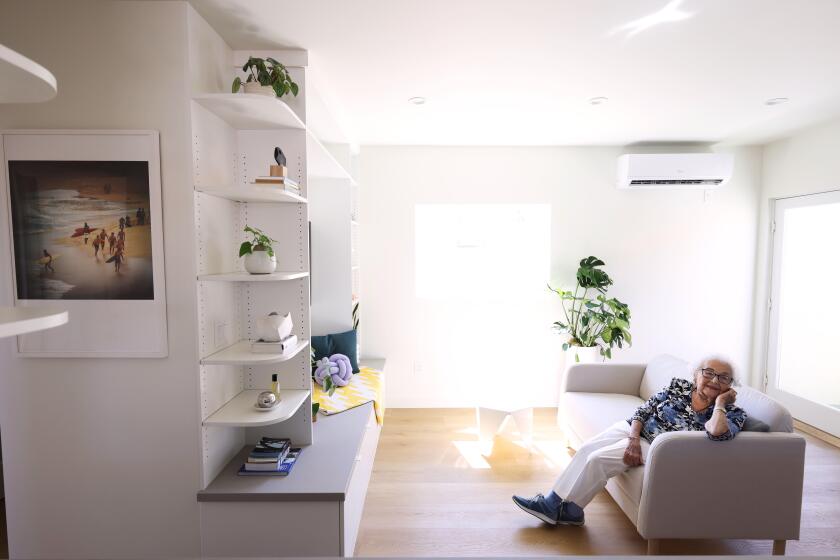Frequency of Filming at House to Be Decided : Los Feliz: A city board will be asked to settle a dispute over a Frank Lloyd Wright structure. Residents say movie crews cause traffic and disruption.
The Los Angeles Board of Public Works will be asked to rule on a dispute over filming restrictions at a historic Frank Lloyd Wright house in Los Feliz, after negotiations appeared to falter Tuesday between neighbors, film industry representatives and the house’s curator.
The board is scheduled to decide May 3 how often movie and commercial filming can take place at the Ennis-Brown House, a famous mock Mesoamerican block structure with a Mayan motif at 2607-2655 Glendower Ave.
The distinctive house is owned by a nonprofit organization. Designed by Wright in 1924, it is listed on the National Register of Historic Places and designated as a Los Angeles Historic Cultural Monument.
The house has been featured in movies such as “Black Rain” and “Karate Kid III,” TV shows such as “Twin Peaks” and numerous car commercials, said Charles Weisenberg, director of the motion picture and television division of the public works board.
But its popularity with the film industry has angered neighbors, who complain that frequent filming causes too much noise, traffic and disruption in their hillside community.
“No one cares if there’s an occasional film shot at the Ennis House,” said Fred Chriss, who has led the neighborhood’s protest. “But if I wanted to live across the street from a movie studio, I would have moved to Universal City instead of Glendower Avenue.”
The public works board a month ago directed Chriss and other neighbors to negotiate an agreement with film industry representatives and curator Augustus (Gus) Brown.
Brown, a former union organizer, bought and moved into the house in 1968. In 1980, he donated it to the Trust for the Preservation of Cultural Heritage, a nonprofit organization he formed to raise funds for the upkeep of the house. He has continued to live in the house under an agreement connected to the donation.
After a two-hour meeting Tuesday, representatives of the groups reluctantly agreed to submit to the board next week a proposal allowing seven filming permits each year, at a limit of one per month and up to three days each.
But Weisenberg warned that the board may not necessarily approve the proposal. The most restrictive filming limitation ever approved by the board is 10 one-day permits per year at another location in Los Angeles, he said.
Brown said after the meeting that he was displeased with the proposal because it could restrict film companies from using the house--and thus limit revenue badly needed to pay for an estimated $1-million worth of repairs.
Representatives of the city’s film development committee and several major film industry groups, including the Alliance of Motion Picture and Television Producers and the Assn. of Independent Commercial Producers, consented to presenting to the board the deal offered by neighborhood leaders.
But some said they believed the proposal was too restrictive, would not meet demand for the house as a film setting and possibly could ward off companies that found other provisions demanded by the residents too cost-prohibitive.
The board’s motion picture division last year allowed 21 days of filming at the house, according to Weisenberg. But neighbors complained that they actually endured 53 days of disruption because the film crews spent days before and after filming to set up and take down sets.
The dispute over filmmakers’ access to the Ennis-Brown House is part of a protracted battle between Brown, the trust and his neighbors.
Neighboring residents in 1989 successfully petitioned city officials to stop Brown from renting the house for parties, receptions, weddings and other private assemblies, despite Brown’s claim that the revenue was being used to pay for restoration of the house.
In the last several years, preservationists, neighbors and others, including former members of the trust’s board of directors, increasingly have called on Brown to resign as curator and as the trust’s executive director.
And the state attorney general’s office now is investigating a complaint filed last September by seven former trust directors, who charged that Brown mismanaged the trust’s finances and improperly wielded too much power over the nonprofit organization. Brown has denied those claims.
More to Read
Sign up for Essential California
The most important California stories and recommendations in your inbox every morning.
You may occasionally receive promotional content from the Los Angeles Times.









